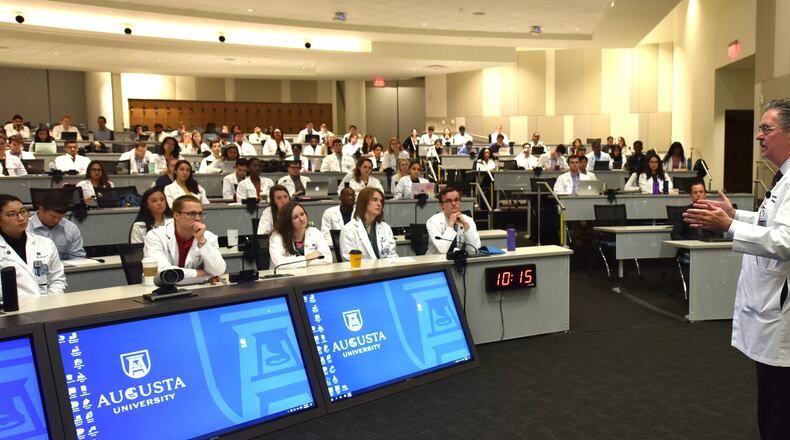Last year, Augusta native Susan Brands was learning how to do CPR.
Next week, she’ll put her additional medical skills to practice to combat the coronavirus.
Brands, 25, is among 400 third- and fourth-year students at the Medical College of Georgia at Augusta University who are scheduled to begin assisting the state’s 18 public health districts, advising patients about whether they need to be tested for the virus and performing other tasks, the college announced this week.
They’re among the many medical students statewide getting an early start to their medical careers as crowded hospitals grapple with the flood of patients seeking care.
Morehouse School of Medicine, near downtown Atlanta, said it is working on a plan to allow its fourth-year students to do various forms of volunteer work at Grady Memorial Hospital.
The Augusta students will not have physical contact with patients. Much of their work will be telemedicine, talking to the sick and giving patients advice based on their symptoms online and over the phone. The students will assist drive-thru testing centers and receive online pandemic medicine training before going into the field.
“This is something where there is a big need,” said Brands. “The city has given me so much. It makes me want to find ways to give back.”
Brands, the school’s third-year class president, said classmates presented the idea to administrators. About 95% of the school’s students are from Georgia. The telemedicine will be part of an elective class, and students will receive credits similar to other electives.
“Students are trained to communicate between experts and the public,” said Dr. D. Douglas Miller, the college’s vice dean for academic affairs. “They could help relieve some of the stress on the physician … and advanced practice provider workforce that is and will continue to be overly taxed during the COVID-19 pandemic.”
Some students are already doing their own volunteer work. Brands and classmates are also contacting local businesses, such as nail salons and tattoo parlors, asking if they have extra masks to donate. Emory medical students are screening calls at the university’s COVID-19 hotline center. Philadelphia College of Osteopathic Medicine (PCOM) students have set up free grocery delivery services for elderly residents in Gwinnett County, where the college has a campus. Mercer University medical school students are also delivering groceries to the elderly and assisting the Red Cross with blood drives.
“They have gone out of their way to help others,” said Mercer dean Dr. Jean Sumner.
Others are returning to their hospital positions. First-year PCOM student doctor Daaniya Jamal returned to work as a registered nurse in the Surgical/Trauma ICU at Grady.
The coronavirus has disrupted class schedules for students statewide. College campuses have closed to prevent the spread of the virus, and most colleges and universities are moving to online or remote learning for the rest of the spring semester. It has resulted in additional changes for medical students.
The Association of American Medical Colleges last week recommended a minimum two-week suspension of clinical clerkships for students out of concern for them possibly interacting with patients infected with the virus. The time out allows colleges to implement appropriate student and patient safety measures and to conserve personal protective equipment for medical employees. Medical schools contacted by The Atlanta Journal-Constitution said they are following the recommendation.
Students in other parts of the country have found additional ways to help. They include checking in with patients after operations or after being discharged, and babysitting for health care professionals working long hours.
Additionally, New York University’s medical school is allowing senior medical students to graduate three months early so they can help overworked doctors, according to news reports. A medical school accrediting body gave guidance late Wednesday to medical schools interested in offering early commencements. Sumner said the idea has merit, but they are focusing on helping students find other ways to assist during the crisis. Mercer’s May 2 commencement for medical students is weeks away, she noted.
In Augusta, the primary goals for the upcoming plan are that students get a better understanding of the virus and how it functions, compare it to past pandemics and apply what they learn with patients, officials told the AJC. Augusta, which has the nation’s ninth-largest medical school, with nearly 1,000 students, is collaborating with Columbia and Harvard medical schools as part of the elective.
About the Author
Keep Reading
The Latest
Featured


